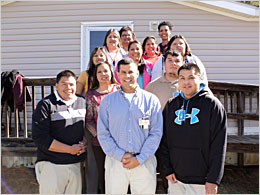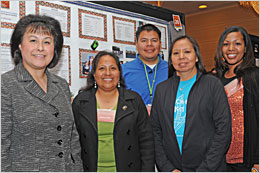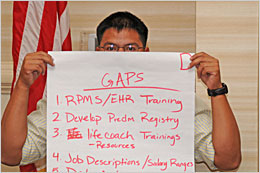Mississippi Band of Choctaw Starts with Diabetes Prevention Activities, Expands to Diabetes Management

Mississippi Choctaw Diabetes Prevention Program.
The Mississippi Band of Choctaw Indians (MBCI) was awarded its first SDPI grant in 1998. The Community Directed Diabetes Prevention Program initially began with three staff members. In the beginning, staff conducted many community events such as walks, blood sugar screenings and health fairs. In 2004, the Demonstration Project (now the SDPI Diabetes Prevention Initiative) was added to the Mississippi Choctaw Diabetes Prevention Program.
Fourteen years after being awarded its first SDPI grant, MBCI/SDPI Program Manager Darlene Willis looks back at what she and her staff have learned. "We have matured professionally," she says. "We were always focusing solely on prevention of diabetes. It was like I had tunnel vision. I paid very little attention to the management aspect of diabetes."
About three years ago, Darlene took a closer look at the program, assessing its structure and personnel. She read every word of the grant application. "I had an epiphany," recalls Darlene. "I realized I was listed as the person responsible for the grant operations of the program. I thought, 'This is mine.' I realized I had complete autonomy over the program and, at that moment, the tunnel vision of doing just diabetes prevention activities lifted."

Mississippi Choctaw Diabetes Prevention Program poster session.
She decided to call a meeting of "the minds," everyone who was providing diabetes care within the SDPI grant programs. This included physicians, podiatrists, dietitians, and the CDE. She says it was a pivotal point in the program's structure. Darlene said to the group, "We are here today because we have one thing in common, DIABETES. We receive grant funding for diabetes prevention and management. We all need to begin to work together for better results. NOW is the time to begin to work in unison for our people's sake."
Darlene carefully reviewed the Diabetes Audit and realized improvements and adjustments were needed. With the help of the hospital's Clinical Applications Coordinator (CAC), she began to understand what needed to be done. The CAC was initiating the "Improved Patient Care Committee" through IHS Improving Patient Care Model. The IPC model led to establishing the "I Care Team" within the hospital which led to the birth of "Diabetes Wellness Day" in coordination with the Retinopathy Clinic.
During Diabetes Wellness Day, a patient is provided a foot exam, eye exam, exercise instruction, diabetes education, nutrition assessment, depression screening, height/weight/blood pressure measurements, labs, dental exam, and immunizations. "Diabetes Wellness Day is all-inclusive. It is like one-stop shopping for our patients. It takes only a couple of hours for patients to receive services that, if scheduled one at a time, could take an entire year to complete. Patients love it and the Diabetes Audit Report improved tremendously," says Darlene.

Man holding list for improving program.
The MBCI SDPI Program has grown to eleven staff members. Diabetes prevention activities are still a big part of it. For example, the SDPI DP Initiative recruits, assesses, and diagnoses patients for pre-diabetes, then enrolls them in a 16-week intensive diabetes prevention class.
The MBCI SDPI-funded Community Directed Diabetes Prevention Program also is lessening the impact of diabetes by implementing two Best Practices (Foot Care and Eye Care). "For so long, we focused on prevention activities. We are now putting extra effort into implementing the Best Practices. It's new for us, but someday it will be as automatic as doing diabetes prevention activities," says Darlene.
"We are always looking for better ways of doing things because our goal is to improve the health care of our patients. We love to share our ideas with others and we will always welcome others' ideas. One thing I do is always reflect back to the mission and vision of the Choctaw Health Department which is to 'raise the status of the Choctaw people to the highest level possible'. This mission keeps me focused."


